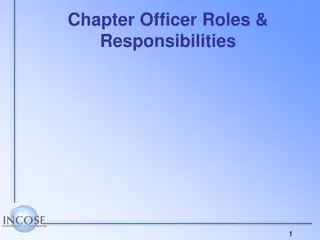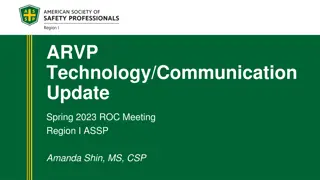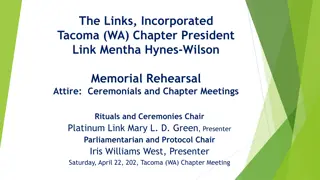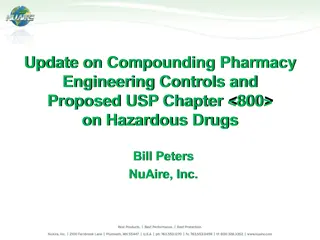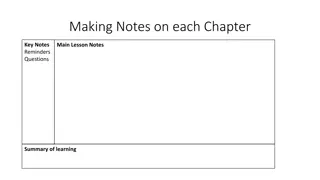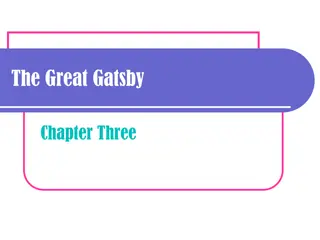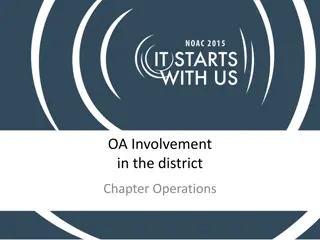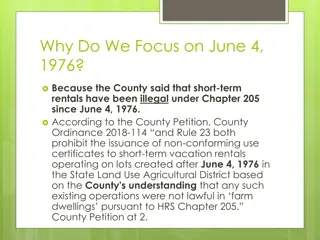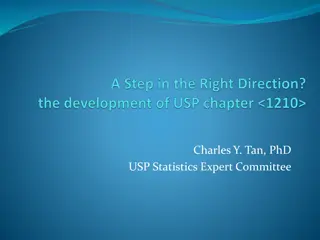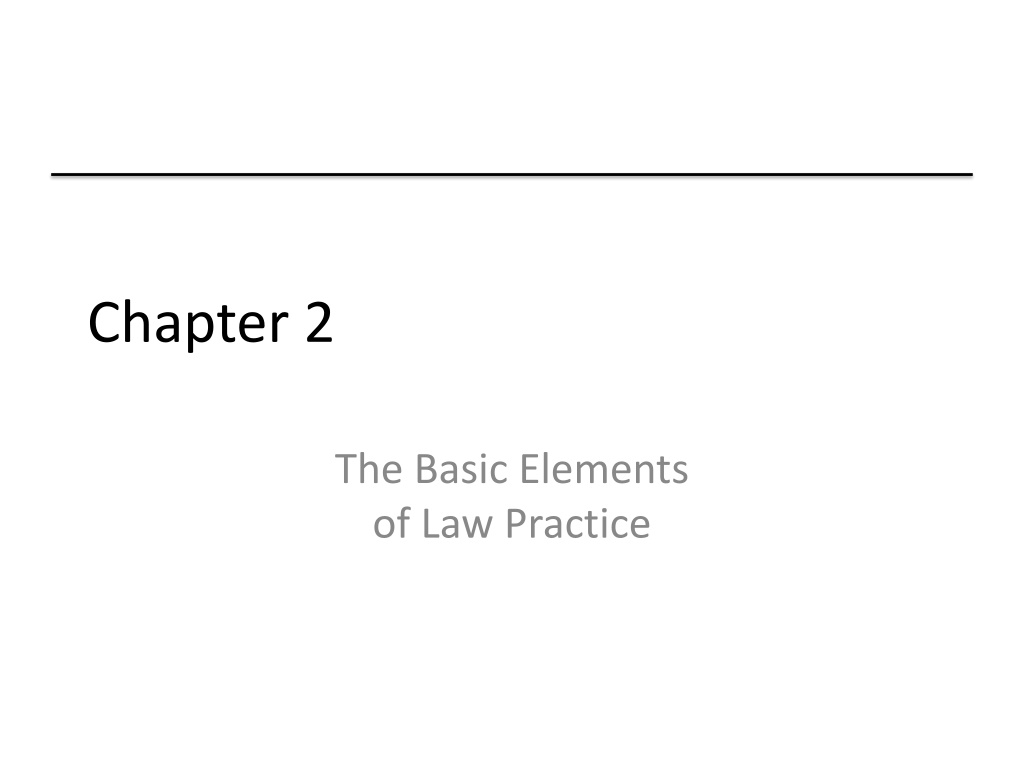
Understanding the Basic Elements of Law Practice
Explore the fundamental elements of law practice including restrictions on nonlawyer practice, unauthorized practice of law, responsibilities regarding nonlawyer assistants, and practical scenarios involving legal software and law firm management. Delve into key legal concepts and cases to enhance your understanding of the legal profession.
Download Presentation

Please find below an Image/Link to download the presentation.
The content on the website is provided AS IS for your information and personal use only. It may not be sold, licensed, or shared on other websites without obtaining consent from the author. If you encounter any issues during the download, it is possible that the publisher has removed the file from their server.
You are allowed to download the files provided on this website for personal or commercial use, subject to the condition that they are used lawfully. All files are the property of their respective owners.
The content on the website is provided AS IS for your information and personal use only. It may not be sold, licensed, or shared on other websites without obtaining consent from the author.
E N D
Presentation Transcript
Chapter 2 The Basic Elements of Law Practice
Model Rule 5.5 Unauthorized Practice of Law; Multijurisdictional Practice of Law URL: http://www.americanbar.org/groups/professional_responsibility/publications/model_ rules_of_professional_conduct/rule_5_5_unauthorized_practice_of_law_multijurisdic tional_practice_of_law.html
Question 2-1 What is the rationale offered for restrictions on nonlawyer practice?
Question 2-2 As a general rule, in most jurisdictions a nonlawyers may do the all of following except:
Florida Bar v. Brumbaugh 355 So. 2d 1186 (Fla. 1978)
Question 2-3 Legal Software Inc. makes available to consumers a program that helps them fill out legal forms. The software asks the consumer to answer personal questions regarding the consumer s circumstances and preferences regarding the consumer s legal problem. Based on the answers, the program helps the consumer complete the appropriate form, suggesting specific provisions tailored to the consumer s needs and preferences. Has Legal Software Inc. engaged in unauthorized practice of law?
Unauthorized Practice of Law Committee v. Parsons Technology, Inc. 199 WL 47235 (N.D. Tex. 1999)
Model Rule 5.3 Responsibilities Regarding Nonlawyer Assistant URL: http://www.americanbar.org/groups/professional_responsibility/publications/model_ rules_of_professional_conduct/rule_5_3_responsibilities_regarding_nonlawyer_assist ant.html
Question 2-4 An attorney is a senior partner at a law firm in which there are 50 lawyers. The firm pays each of its lawyers a fixed annual salary. In addition, at year s end, each lawyer receives a bonus from the profits of the firm in the proportion that the annual salary of each bears to the total of the fixed annual salaries of all lawyers. The attorney plans to introduce a new management plan under which the firm s nonlawyer office administrator would have general charge of all business matters but would have general charge of all business matters but would not participate in any decisions involving legal judgment. The administrator would be paid a fixed annual salary and would be included as a participant in the firm s bonus plan on the same basis as the lawyers in the firm. This would usually yield a bonus of approximately one-fourth to one- third of the administrator s total annual compensation. The amount paid to the administrator will not exceed the compensation commonly paid to law office administrators within the local legal community. Is it proper for the attorney to institute such a plan?
Model Rule 5.4 Professional Independence of a Lawyer URL: http://www.americanbar.org/groups/professional_responsibility/publications/model_ rules_of_professional_conduct/rule_5_4_professional_independence_of_a_lawyer.ht ml
Question 2-5 An attorney is a member of the bar and a salaried employee of a bank s trust department. As part of his duties, he prepares a monthly newsletter concerning wills, trusts, estates, and taxes that the bank sends to all of its customers. The newsletter contains a recommendation to the customer to review his or her will in light of the information contained and, if the customer has any questions, to bring the will to the bank, where the attorney will review the customer s will and answer the customer s legal questions. The bank provides that attorney s services to its customers for no charge. Is the attorney subject ot discipline for the foregoing?
Question 2-6 A business attorney entered into a partnership with a certified public accountant. The partnership provided legal and other assistance to clients in connection with business and tax planning, tax filings, and other personal and corporate business matters. The accountant performed only work that she was authorized to perform as a certified public accountant. The attorney made reasonable efforts to ensure that the accountant did not interfere with the attorney s compliance with his professional obligations as a lawyer. Is the attorney subject to discipline?
Question 2-7 Joan Lawyer has a leading real estate practice in Small County. She is also part owner of Small County Title. She suggests to her clients who purchase real estate that they consider purchasing their title insurance from Small County Title. Joan discloses in writing that she owns the company and recommends that her clients consider the rates and policies of competing title insurance companies. She explains that the services provided by Small County Title are not legal services and that the legal ethics rules do not apply to the purchase of title insurance. Joan suggests that clients feel free to consult another lawyer as to whether they should purchase title insurance from a company their real estate lawyer owns. The rates and policies that Small County Title offers are comparable to those of its competitors. Which of the following is true:
Model Rule 5.7 Responsibilities Regarding Law-related Services URL: http://www.americanbar.org/groups/professional_responsibility/publications/model_ rules_of_professional_conduct/rule_5_7_responsibilities_regarding_law_related_serv ices.html
Model Rule 1.8(a) Current Clients: Specific Rules URL: http://www.americanbar.org/groups/professional_responsibility/publications/model_ rules_of_professional_conduct/rule_1_8_current_clients_specific_rules.html
Question 2-8 Giant Manufacturer wants to buy widgets from Small Producer. Both Giant and Small are headquartered in California. Smalls outside counsel, John Lawyer, admitted to practice in New York, travels to California from his New York office to negotiate the deal on Small s behalf. After extensive negotiations, Giant agrees to pay Small $10 million for the widgets. John bills Small $500 thousand for legal fees. Small believes the fee is far too high and refuses to pay. If retains a California lawyer and decides to argue that it does not have to pay anything to John Lawyer because he was engaged in unauthorized practice of law. Small s argument:
Birbrower, Montalbano, Condon & Frank, P.C. v. Superior Court 949 P.2d 1 (Cal. 1998), cert denied, 525 U.S. 920 (1998)
Model Rule 8.5 Disciplinary Authority; Choice of Law URL: http://www.americanbar.org/groups/professional_responsibility/publications/model_ rules_of_professional_conduct/rule_8_5_disciplinary_authority_choice_of_law.html
Question 2-9 Joan Jones is an associate and Franklin & Ignatius. She is admitted to the New York Bar. The firm sends her to the State of Sirius to appear in court in a case where the firm has been admitted pro hac vice. Has she committed UPL?
Question 2-10 Did Joan Jones violate UPL when she entered Sirius to investigate and prepare the case before the firm and its lawyers were admitted pro hac vice?
Question 2-11 Would she have violated UPL if the firm had brought an arbitration on behalf of its client and not a court case?
Question 2-12 Does Joan violate UPL if she transfers full-time to F&I s Sirius office and works under the supervision of a Sirius admitted attorney?
Question 2-13 Does Joan commit UPL if she leaves F&I to become in-house counsel at Monolith, Inc., located in Sirius?
Question 2-14 Joan rejois F&I as a partner in its New York office. As a corporate partner, she is in charge of representing ABC, Inc., based in New Jersey, in its takeover of DEF, Inc., based in New York. Her team includes Jim, a NY lawyer coordinating the NJ litigation, and Jane, a corporate associate admitted in NY and NJ. The discover ABC has made a fraudulent statement relevant to the litigation. NJ requires disclosure. NY does not. The F&I lawyers do not disclose. Which of the following is true?
Restatement 14 A relationship of client and lawyer arises when: (1)a person manifests to a lawyer the person s intent that the lawyer provide legal services for the person; and either (a) the lawyer manifests to the person consent to do so; or (b) the lawyer fails to manifest lack of consent to do so, and the lawyer knows or reasonably should know that the person reasonably relies on the lawyer to provide the services; or
Question 2-15 Your friend George finds you at a party. He explains that he is having a problem with his landlord and asks your advice. You tell him what you learned about his problem in property class and explain it to him. Which of the following is correct?
Question 2-16 An attorney closed her law practice when she became a state senator. A bank, one of the senator s former private clients, asked her as its senator to try to persuade a state agency to grant the bank a license to open a new branch bank. While the bank s request was pending before the agency, the senator wrote a letter on her legislative letterhead to the agency s chair, asserting that the branch would satisfy a local business need and urging that the bank s application be granted. The senator neither sought nor received any compensation from the bank for her efforts. Eventually the agency granted the bank s application, in part because of the senator s efforts. Is the senator subject to discipline?
Question 2-17 Lincoln & Fordham has represented Center Manufacturing in its transactional work. The SEC begins an investigation of Center Manufacturing. Lincoln & Fordham explains to Center that it cannot represent it in the SEC investigation. Center obtains other counsel. Nonetheless, from time to time, Center asks Lincoln & Fordham about issues that arise in the SEC matter and Lincoln & Fordham provides answers. Does Center have a lawyer-client relationship with Center for purposes of the SEC investigation?
Morris v. Margulis & Grant, P.C., Morris v. Margulis 718 N.E. 2d 709 (Ill. App. Ct., 5thDist. 1999), rev d on other grounds, 754 N.E. 2d 314 (Ill. 2001)
Question 2-18 The firm of Lincoln & Fordham represents the Computer Software Association, an organization of businesses who manufacture computers or create software, in challenging proposed regulations regarding data privacy. Lincoln & Fordham has collected information on business practices from each of the businesses in the Association. Lincoln & Fordham agrees to represent one of those businesses, GoFind, in an antitrust suit against another, MacroTough. Was MacroTough a client of Lincoln & Fordham by virtue of its representation of the Computer Software Business Association?
Model Rule 1.13 Organization as Client URL: http://www.americanbar.org/groups/professional_responsibility/publications/model_ rules_of_professional_conduct/rule_1_13_organization_as_client.html
Westinghouse Elec. Corp. v. Kerr-McGee Corp. 580 F.2d 1311 (7thCir. 1978), cert. denied, 439 U.S. 955 (1978).
Model Rule 6.2 Accepting Appointments URL: http://www.americanbar.org/groups/professional_responsibility/publications/model_ rules_of_professional_conduct/rule_6_2_accepting_appointments.html
Question 2-19 The court appoints a lawyer who believes that abortion is murder to represent a teenage girl seeking court permission to obtain an abortion without the consent of her parents. The lawyer explains that he believes that abortion is murder and asks the court to withdraw the appointment. The court refuses. Under the Rules, which of the following is true?
Board of Professional Responsibility of the Supreme Court of Tennessee Formal Ethics Op. No. 96-F-140, 1996 WL 340719 (1996)
Question 2-20 Joan Lawyer practices matrimonial law. She only represents women because she seeks to redress the social and legal wrongs done to women. John Client asks her to represent him. She refuses on the ground that he is a man. John Client sues her for unlawful discrimination. Under Nathanson v. MCAD, what is the result?
Nathanson v MCAD 2003 WL 22480688 (Mass. Super.)
Question 2-21 Attorney Alpha, a sole practitioner, recently suffered a heart attack and was advised that she should not return to work for six months. Alpha delivered all of her clients files to Attorney Beta, who is also a sole practitioner. Beta agreed to review each client s file promptly, take any action necessary to protect each client s interests, and treat the information in the files as confidential. Alpha then wrote her clients, advising each client that the client s file had been delivered to Beta for review and for any action necessary to protect the client s interest, and that the client was free to select another lawyer. Alpha knows that Beta is a competent attorney. Beta did not accept the file of any person whose interests were, or could be, adverse to the interests of any of Beta s own clients. Was it proper for Alpha to deliver the files to Beta for review?
Question 2-22 Attorney is employed in the legal department of Electco, a public utility company, and represents that company in litigation. Electco has been sued by a consumer group that alleges Electco is guilty of various acts in violation of its charter. Through its general counsel, Electco has instructed Attorney not to negotiate a settlement but to go to trial under any circumstances since a precedent needs to be established. Attorney believes the case should be settled if possible. Must attorney withdraw as counsel in the case?
Restatement 31 b) Rationale. Just as mutual consent is usually a prerequisite to creating the client-lawyer relationship, the end of such consent usually ends the relationship. Consent might end because client of lawyer withdraws consent or becomes incapable of giving a valid consent. Alternatively, the lawyer might have completed the representation or have become incapable of providing services to completion.
Model Rule 1.16 Declining or Terminating Representation URL: http://www.americanbar.org/groups/professional_responsibility/publications/model_ rules_of_professional_conduct/rule_1_16_declining_or_terminating_representation.h tml
Model Rule 3.1 Meritorious Claims and Contentions URL: http://www.americanbar.org/groups/professional_responsibility/publications/model_ rules_of_professional_conduct/rule_3_1_meritorious_claims_contentions.html
Question 2-23 An Attorney represents a Client in commercial litigation that is scheduled to go to trial in two months. Over the past several weeks, the Client has disagreed with almost every tactical decision that the Attorney has made. Frustrated, the Attorney finally said to the Client that if the Client didn t like the way he was handling the lawsuit, then perhaps the Client should get another lawyer. The Client was upset at the suggestion and accused the Attorney of trying to get out of the case. Reasonably believing that he could no longer work effectively with the Client, the Attorney sought the Client s permission to withdraw from the representation, and the Client reluctantly agreed. After giving the Client sufficient notice to obtain replacement counsel, the Attorney requested the Court s permission to withdraw from the litigation, but the Court denied the request. May the attorney withdraw from the representation?
Whiting v. Lacara 187 F.3d 317 (2d Cir. 1999)
Question 2-24 Attorney experienced several instances when clients failed to pay their fees in a timely manner, but it was too late in the representation to withdraw without prejudicing the clients. To avoid a recurrence of this situation, Attorney drafted a stipulation of consent to withdraw if fees are not paid according to the fee agreement. She proposes to have all clients sign the stipulation at the outset of the representation. Is is proper for attorney to use the stipulation to withdraw from representation whenever a client fails to pay fees?
Question 2-25 True or False: Rule 1.16 implements the dominant conception that the lawyer should serve as a neutral partisan for her client.
Question 2-26 Attorney represented Plaintiff in an action against several defendants. The retainer agreement provided that Plaintiff would pay all costs and expenses of litigation and would, on demand, reimburse Attorney for any costs or expenses advanced by Attorney. After serving process on two defendants, Attorney had difficulty locating and serving the remaining defendants. Plaintiff approved the hiring of an investigator to locate and serve the defendants, and Attorney advanced the costs for the investigator. When Attorney asked Plaintiff for reimbursement, Plaintiff refused to pay. Attorney then told Plaintiff that Attorney would do no more work on the case until Attorney was reimbursed for the amount advanced. Thereafter, one of the defendants filed a counterclaim that required a responsive pleading within thirty days. Because Attorney had not been paid, Attorney permitted the time to respond to the counterclaim to expire without filing a responsive pleading, and a default was entered on the counterclaim. Later, Plaintiff reimbursed Attorney for the costs Attorney had advanced, and Attorney was successful in having the default on the counterclaim set aside. The case was tried, and Plaintiff prevailed on Plaintiff's complaint, and the counterclaimant recovered nothing. Is Attorney subject to discipline for not initially filing a responsive pleading to the counterclaim?
Question 2-27 Witness was subpoenaed to appear and testify at a state legislative committee hearing. Witness retained Attorney to represent her at the hearing. During the hearing, Attorney, reasonably believing that it was in Witness's best interest not to answer, advised Witness not to answer certain questions on the grounds that Witness had a constitutional right not to answer. The committee chairperson directed Witness to answer and cautioned her that refusal to answer was a misdemeanor and that criminal prosecution would be instituted if she did not answer. Upon Attorney's advice, Witness persisted in her refusal to answer. Witness was subsequently convicted for her refusal to answer. Is Attorney subject to discipline?
Question 2-28 A sole practitioner was appointed to represent a criminal defendant on appeal. A recently admitted lawyer who shared office space with the sole practitioner agreed to write the brief if the sole practitioner would pay him one-half of the statutory fee. The defendant agreed to the arrangement in writing, after a full consultation. The recently admitted lawyer entered an appearance as co-counsel for the defendant and, with the sole practitioner's knowledge, applied for and received several extensions of time to file the brief. Subsequently, the appellate court dismissed the appeal for failure to pursue the appeal. A third lawyer was later appointed to represent the defendant, whose conviction was affirmed after the appeal was reinstated. Is the sole practitioner subject to discipline?
Model Rule 1.1 Competence URL: http://www.americanbar.org/groups/professional_responsibility/publications/mode l_rules_of_professional_conduct/rule_1_1_competence.html

